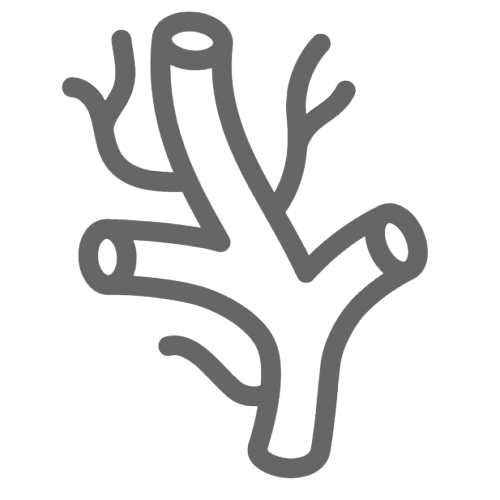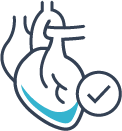What is an Angiogram?
An angiogram is a medical imaging procedure used to visualise blood vessels in the body. It helps diagnose conditions like blockages, aneurysms, or other abnormalities in arteries. By injecting a special contrast dye into the bloodstream, an angiogram enables clear images of the vascular system, allowing doctors to assess blood flow and detect potential issues. Angiograms are commonly used for heart, abdominal, and pulmonary diagnostics.
At GXU, we specialise in non-invasive CT angiograms, providing patients with a quick and accurate way to diagnose vascular conditions.

How Does an Angiogram Work?
Angiograms work by using advanced imaging technology to capture detailed pictures of the blood vessels. A contrast dye is first injected into the bloodstream, making the vessels visible on CT scans. The dye travels through the circulatory system, highlighting areas where blood flow may be obstructed or abnormal and demonstrating plaque deposits.
At GXU Radiology Specialists, we use state-of-the-art CT angiography, which involves a CT scanner that rotates around the body, capturing multiple images. These images are then processed to create 3D visuals of the blood vessels, allowing for accurate diagnosis of conditions like artery blockages or pulmonary embolisms (a clot within the lung).
Types of Angiograms Offered

Abdomen Angiogram
An abdomen angiogram is a diagnostic imaging test which highlights the blood vessels in the abdomen. These vessels supply blood to the major organs such as the spleen, liver and kidneys. Using our CT scanner, and an injection of contrast dye, we can capture detailed images of the vascular system within the abdomen.
This test is often requested to examine the aorta, the largest artery in the body, to assess for any evidence of dilation (or aneurysm).

Coronary CT Angiogram
A coronary CT angiogram is a specialised, non-invasive medical test that offers a deeper look into the heart’s condition. Using advanced technology, this scan captures numerous images from various angles as you comfortably lie on a sliding table that moves through a large, ring-shaped machine. These multiple snapshots are then compiled by a computer to produce a comprehensive 3D view of your heart’s blood supply, giving unparalleled clarity and detail.
Doctors use this test to examine the coronary arteries more closely assessing blockages or narrowing, helping diagnose coronary artery disease and other heart conditions.

Pulmonary Angiogram
A pulmonary angiogram is a diagnostic imaging procedure which assesses the blood vessels in the lungs. We perform this angiogram using our CT scanner and an injection of contrast dye to highlight the blood vessels more clearly.
This angiogram is primarily performed if a doctor is concerned about a blood clot in the lungs, but is also used to assess for other lung conditions, such as vascular malformations.
Bulk Billed Angiograms
At GXU Radiology, we offer bulk billing for angiograms if you have a specialist referral and a valid Medicare card, ensuring no out-of-pocket costs for your procedure. To make the process easy, just bring your Medicare card and specialist referral (addressed to GXU or any radiology practice) to your appointment.
If you have a referral from a GP, please let us know at the time of booking, so that we can advise you if there may be a fee for the angiogram.
Symptoms & Conditions Diagnosed with Angiograms
Angiograms are used to diagnose various conditions that affect the blood vessels. Depending on the location and symptoms, different types of angiograms are recommended:
These symptoms may indicate coronary artery disease (CAD), where blockages in the heart’s arteries restrict blood flow. A coronary CT angiogram can visualise these blockages and help diagnose conditions like angina or heart attacks.
If a patient experiences shortness of breath, chest pain, or coughing up blood, a pulmonary angiogram may be required. This test is crucial in diagnosing PE, where blood clots block arteries in the lungs.
Patients with unexplained abdominal pain or suspected aneurysms may undergo an abdomen angiogram. This helps detect abdominal aortic aneurysms, where the aorta dilates.
Severe pain in the legs while walking can indicate narrowing of the arteries supplying blood to the legs. Leg Angiograms are also used to assess blood flow in the lower extremities and diagnose conditions like iliac artery stenosis.
Where we Operate our Angiogram Services
Our angiograms are conducted at our Thornton practice, conveniently situated within the Thornton Healthcare complex, which offers a range of medical services including pathology, obstetrics, physiotherapy, and podiatry.
We are easily accessible, just a 30-minute drive from Newcastle and 10 minutes from Maitland, with the practice offering plenty of free onsite parking. Given the specialised nature of our service, we also regularly welcome patients from Taree, Gloucester, Scone, Tea Gardens, and the Central Coast.
For public transport options, a bus stop is conveniently located right outside our building on Anderson Drive. If you’re arriving by taxi, our friendly reception team can assist with arranging one for you.

Why Book an Angiogram with GXU?
We bulk bill all diagnostic Medicare-eligible referrals, so you can focus on your health, not the cost.
Our team are passionate about cardiac imaging, and are committed to providing high-quality imaging for precise and accurate reports.
Our latest Siemens CT Scanner, installed in December 2023, offers superior image quality with the lowest radiation dose.
An onsite cardiac radiologist and registered nurse supervise your scan, ensuring safety and accuracy.
Scans are reported by radiologists and cardiologists with subspeciality training.
We use the latest contrast injector technology for low doses and excellent image quality.
What Our Customers Say
EXCELLENTTrustindex verifies that the original source of the review is Google. Was very happy with how professional everyone was. Dr was so gentle with cortisone injection. I found the staff be be polite and caring. Would highly recommendTrustindex verifies that the original source of the review is Google. Staff were very friendly and professional. My Biopsy was painless with every step explained. Could not have asked for better care. I highly recommend GXU.Trustindex verifies that the original source of the review is Google. I was running late and they still fit me in. Explained the procedure thoroughly. All staff were amazing. Thoroughly recommend.Trustindex verifies that the original source of the review is Google. The staff were great the waiting time was good I had a good experience there with no complaints at allTrustindex verifies that the original source of the review is Google. Greeted by friendly and professional staff who talked through the MRI process in detail and made it as comfortable as possible throughout.Trustindex verifies that the original source of the review is Google. Staff were friendly, polite and helpful. I had a ct scan guided injection in my back and the procedure went smoothly and was pain free. Highly recommendTrustindex verifies that the original source of the review is Google. Staff were courteous, professional and kind. It was an overall a good experience and I will definately go there again.Trustindex verifies that the original source of the review is Google. Friendly efficient, caring, they always go beyond to get you into an earlier appointment if they canTrustindex verifies that the original source of the review is Google. The experience attending this clinic is second to none. The care and treatment is patient centred. Everyone is so lovely, warm and welcoming from the moment you walk in the door. Best experience I have had attending a radiology clinic in years. Highly recommend 😊
Book an Angiogram Today
To book an angiogram, speak to one of our team at our Thornton clinic, or get in touch on 02 4999 6499.
Some of our specialised tests including CT Coronary Angiograms require special preparation which we will inform you of at the time of booking.
Frequently Asked Questions
How long does an angiogram take?
An angiogram typically takes about 30 minutes to complete, depending on the complexity of the procedure and the area being imaged. In some cases, additional time may be needed for preparation and post-procedure monitoring. Some angiograms may take only 15 to 30 minutes. After the procedure, you may need to stay for a short observation period before going home.
How long does angiogram dye stay in the body?
The contrast dye used during an angiogram usually stays in the body for several hours. It is filtered out by the kidneys and is typically eliminated through urine within 24 hours. Drinking plenty of fluids after the procedure can help speed up this process and flush the dye from your system.
What are the risks of having an angiogram?
Angiograms are a commonly performed safe investigation. any medical procedure rare side effects can occur. Potential side effects include allergic reaction to the contrast dye. Most reactions are mild. This reaction can be severe in approximately 1 in 10,000 patients.
Can I drive home after an angiogram?
After a coronary angiogram, you’ll need someone to drive you home, as you may need to have medication which lowers your heart rate during the procedure. For other angiograms, you are generally fine to drive afterwards.
Does a CT angiogram require fasting?
Yes, fasting is often required before a CT angiogram. You’ll usually be asked to avoid eating or drinking anything except for water for at least 2 hours before the procedure. This is to ensure clearer imaging and to reduce the risk of nausea if contrast dye is used. Your radiology team will provide specific instructions before your appointment.



